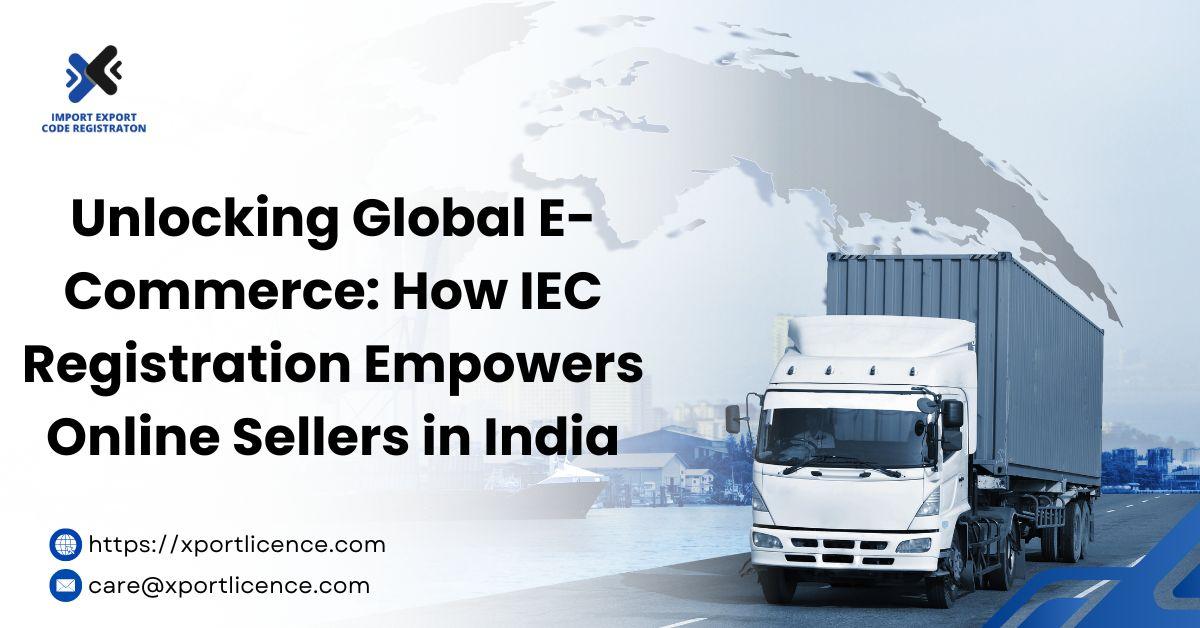Unlocking Global E-Commerce: How IEC Registration Empowers Online Sellers in India

Introduction
India’s digital economy is growing at a rapid pace, and e-commerce is at the center of this growth. Whether it's small handicraft sellers or large brands, more Indian businesses are now selling their products online, not just in India, but across the world.
But to take your online business global, there's one key requirement: IEC Registration.
In this article, we’ll explore how Import Export Code (IEC) registration plays a major role in empowering Indian online sellers to reach global customers, join international marketplaces, and build successful export businesses.
What is IEC Registration?
IEC stands for Import Export Code. It is a 10-digit unique number issued by the Directorate General of Foreign Trade (DGFT) under the Ministry of Commerce and Industry, Government of India.
Any person or business that wants to export goods or services from India or import into India must have an IEC.
Even if you are an online seller planning to sell on Amazon Global, Etsy, eBay, Alibaba, or your website, you will need IEC registration.
Why Online Sellers Need IEC
Many online entrepreneurs start by selling only in India. But global demand for Indian products — from handmade crafts to natural beauty products — is rising. With IEC, Indian sellers can:
-
Reach international customers
-
Sell on global platforms
-
Receive foreign payments legally
-
Ship goods internationally with customs clearance
-
Access export incentives and government schemes
Without IEC, none of this is possible. So, it becomes a key step for every digital entrepreneur who wants to go global.
Role of IEC in Cross-Border E-Commerce
Let’s understand how IEC empowers online businesses at each stage of global e-commerce:
Registering on Global Marketplaces
To sell on platforms like Amazon Global, Etsy, eBay, and Shopee, sellers must provide their Import Export Code during registration. These platforms require it for:
-
Verifying seller identity
-
Complying with international trade rules
-
Enabling cross-border shipping and payments
Without IEC, you simply can't onboard these platforms as an international seller.
Shipping Goods Internationally
When exporting physical products, you must clear customs in India and the destination country. IEC is essential for:
-
Filing shipping documents
-
Creating commercial invoices
-
Customs clearance
-
Getting tracking and logistics support
Courier services and logistics providers also require your IEC before shipping goods abroad.
Receiving International Payments
Whether you're selling digital services (like design, content, coding) or physical products, foreign buyers pay you in international currency like USD, GBP, or EUR.
To receive these payments legally, you need an IEC and a current account enabled for foreign transactions. Banks report your earnings to DGFT and RBI using your IEC.
Accessing Export Benefits
With IEC, online sellers become eligible for government schemes and benefits, such as:
-
Duty Drawback on exported items
-
RoDTEP Scheme (Refund of Duties and Taxes on Exported Products)
-
Interest Equalization Scheme
-
Access to SEIS/MEIS schemes (for service exporters)
These benefits reduce costs and increase profits for global sellers.
Building Brand Credibility
When you have an IEC, it shows that your business is registered, verified, and globally ready. This boosts trust with international buyers, partners, and investors.
Many buyers prefer dealing with exporters who have proper legal registrations like IEC, GST, and MSME (Udyam).
IEC for Online Service Providers
IEC is not just for product sellers. Even if you are offering services online, like:
-
IT & Software development
-
Content writing
-
Online tutoring
-
Freelance design
-
Digital marketing
If you are receiving money from outside India, you must have an IEC.
This ensures compliance with FEMA (Foreign Exchange Management Act) and lets you receive foreign payments without any legal trouble.
Step-by-Step Process to Get IEC Registration Online
Getting an IEC today is easy and fully online. Here’s how:
Visit the IEC Portal – Open the official IEC registration website on your browser.
Fill in the Application Form – Enter your business name, type, PAN number, and other required details carefully.
Submit the Application – Review all the details to ensure accuracy before submitting the form.
Pay the Registration Fee – Make the payment online using net banking, credit/debit card, or UPI.
OTP Verification – Enter the OTP sent to your registered mobile number or email for authentication.
Processing & Approval – The concerned authority will verify your details and process the application.
Receive Your IEC Code – Once approved, the IEC code will be sent to your registered email within 1-2 business days.
Documents Required for IEC Registration
-
PAN Card (Individual or Business)
-
Aadhaar Card (For verification)
-
Business Address Proof (Utility Bill/Rent Agreement)
-
Cancelled Cheque or Bank Statement
-
Email ID and Mobile Number
No physical documents are needed. Everything is uploaded online.
Note:- Now you can easily update and renew the iec code online
Conclusion
If you're running an online business in India and dream of reaching global customers, IEC registration is your first and most important step.
It helps you:
-
Expand your reach
-
Receive international payments
-
Get customs clearance
-
Build a credible brand
-
Tap into export incentives
With the e-commerce boom and rising demand for Indian products and services abroad, now is the best time to go global. And IEC is your gateway.
Don’t wait. Get your IEC registration today and start your journey toward international success.
- Art
- Causes
- Crafts
- Dance
- Drinks
- Film
- Fitness
- Food
- Oyunlar
- Gardening
- Health
- Home
- Literature
- Music
- Networking
- Other
- Party
- Religion
- Shopping
- Sports
- Theater
- Wellness


